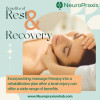Self-control is being able to control your emotions and impulsive behaviors. It is a necessary skill to function as a productive member of society and to create and maintain social relationships. Self-control impacts all areas of our lives such as our career, relationships, diet, and our coping strategies when dealt with difficult situations. Maintaining a good sense of self-control allows you to be disciplined in achieving your long-term goals rather than allowing yourself to become distracted by temptations from being unmotivated. Individuals that struggle self-control will have challenges in refraining from instant gratification. For example, if you had a busy day of important errands that needed to be completed, it would be easier to press the snooze button to sleep in longer in the morning and feel better in that moment. The consequence of that, however, could cause you more stress throughout your day and potentially create an unsafe situation by speeding through traffic.
An important aspect of self-control is being aware of the emotions we are feeling and coping strategies we use to navigate through them. By having good coping strategies, we are able to resist temptations that can potentially be unhealthy for us. Additionally, having a good sense of self-control is also knowing what your triggers and removing yourself from situations that could elicit them.
| Healthy self-control behaviors: | Unhealthy self-control behaviors: |
|
|
Strategies to improve self-control:
- Understanding your feelings (e.g., are you sad, bored, or frustrated?)
- Writing down in a journal your triggers to analyze if there is a pattern involved
- Utilize and ABC Functional Behavior Assessment Form (or whichever strategy works best for you)
- Having a good support system
- Calling a friend or family member you confide in when you are feeling out of control to help you be accountable
- Utilizing coping strategies
- Mindfulness exercises to bring yourself back into the moment
- Practicing mindfulness is extremely beneficial in the long run
- There are a variety of breathing exercises to choose from-this will help you think more clearly or help you relax your mind
- Writing down a mantra that you can always read during stressful or anxious times
- Practicing counting down from 10 before reacting to a situation
- Listening to music that will improve your mood
- Practice walking away or completely avoiding a situation that could be harmful
- Removing items in your environment that you are trying to refrain from (e.g., cleaning out the junk food in your refrigerator)
- Scheduling timed breaks while working to clear your mind, have a snack, or look at social media
- This will help you become less distracted
- Being patient with yourself and understanding that you are doing your best each day
References:
Duckworth, A. L., & Seligman, M. (2017). The Science and Practice of Self-Control. Perspectives on psychological science : a journal of the Association for Psychological Science, 12(5), 715–718. https://doi.org/10.1177/1745691617690880
Psychology Today. (n.d.). Self-control. Psychology Today. https://www.psychologytoday.com/us/basics/self-control



